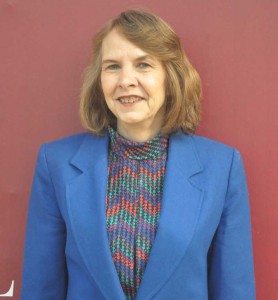Two-term Unionville-Chadds Ford Board of Ed. member enjoys the nuts and bolts of education; points to continued improvement in district schools
By Mike McGann, Editor, UnionvilleTimes.com
It doesn’t take long for Timotha Trigg to make it clear why she enjoys serving on the Unionville-Chadds Ford Board of Education:
“I’m a curriculum person,” said Trigg, an eight-year member of the board, serving the last two as it’s president. A resident of Chadds Ford since 1985, she is a long-time district parent, with two children having graduated from Unionville High School, with two others still attending district schools.
Trigg is one of five candidates in Region C (Chadds Ford, Pennsbury seeking three seats in the Nov. 8 election.
And while taxes, budgets, teacher negotiations and so on are par for the course for discussions, Trigg’s eyes light up when the talk shifts to textbooks, coursework and the real nuts and bolts of education. And she notes, money and other fiscal issues don’t really impact curriculum — which is more about what to teach and how to teach it.
“Money isn’t the issue,” she said. “A bad curriculum doesn’t save you money, while having a good one doesn’t cost any more.”
Trigg expresses some satisfaction that unlike other districts, Unionville has not been subject to “curriculum wars” — pitched battles over what is taught and how it is taught. And while Unionville continues to innovate where it makes sense, she said, the district has been able to resist the latest educational fads, such as “fuzzy math” when other districts have jumped in with both feet and found it necessary to backtrack quickly.
Also, she relishes the challenge of doing her part to continue improving the education being offered to the district’s students — additionally challenging because of the standard of excellence already long established.
“If you have a mediocre district, there’s more room for improvement, naturally,” she said. “With our district, there’s not as much room for improvement — and that makes it more challenging.”
Still, as much as she’d prefer to talk the nuts and bolts of in-classroom education, she readily admits that there are other issues the board must contend with — with shrinking revenue, increasing costs and some division in the community on a range of issues from the high renovation to the recently concluded teacher contract negotiations.
One area she suggested that she’d like to see the district look more closely is the long-term plan for the six district school buildings. While Unionville High School is undergoing a major renovation and should be state-of-the-art with more than enough capacity, the district needs to look at the other buildings and evaluate what needs will emerge in the coming years.
“We really need a long-term facilities plan,” she said. “With the way that the high school was funded, it’s going to be a challenge if we need to do work on other buildings.”
While she acknowledges that Patton Middle School — “it’s our tightest building” and has not seen any major renovations in recent memory — is very likely at the top of the list, she suggests that Hillendale probably bears some study as well, as it has gone some two decades without any major work. She said she’d like to see a Strategic Facility Plan Advisory Council created — with parents, taxpayers and others with a stake empowered to look at the next decade or more for the district’s buildings.
Although she said she’s convinced that eventually the economy will turn around and revenue will eventually pick up — and at that point, some of the choices confronting the district will be a little less stark.
Until then, she said, the board has an obligation to be careful and weigh the needs of students, parents and the rest of the community.
“In any discussion, my job is to find the balance,” she said. “My job is not to try to do what suits my family or any other single family, but what is best for the community as a whole.”
Still, despite the controversy and economic pressures, she points out that Unionville has been lucky to have much less in the way of challenges than neighboring districts. As the district gets a relatively small amount of state and federal aid, the big aid cuts that crippled some neighboring districts were not nearly as devastating. Between that and the new teachers’ contract, she feels the district is well positioned to weather whatever remaining economic issues persist.
“Compared to other districts, I think we’re really in better shape,” she said. “And we have a three-year contract (with the teachers) that’s affordable.”
She admits to being less excited about suggestions the district needs to look for external revenue from naming rights and advertising — not because she objects to it in principle, but because she wonders whether it will make financial sense.
“This is not the panacea some people hope it will be,” she said. “And what is the cost going to be in administration oversight?”
One other thing she says she is proud of: more and better opportunities for the public to participate in public meetings.
“I think we’ve done a good job of accepting public comment,” she said, noting that the public is now able to comment during work sessions and committee meetings. “And we try to respond in some way.”
Her commitment to communication, she said, extends to being happy to engage in one-on-one conversations with members of the community — and she encourages people with questions or concerns — or even just suggestions to contact her.
“Please call me,” she said. “I try to talk to as many people as I can to understand what people are concerned about.”
In addition to serving as board president, Trigg currently chairs the Chester County Legislative Council. Previously, she has chaired the board’s Curriculum Committee and Policy Committee, and has served eight years on the Curriculum Committee. She is also a co-founder of the U.S. Coalition for World Class Math and the Pennsylvania Coalition for World Class Math.
EDITORS NOTE: This is the sixth in a series of profiles of the Board of Education candidates. Next up: Frank Murphy.
Previously run profiles:
Region A
Region C









Two questions:
1. “…she’d like to see a Strategic Facility Plan Advisory Council created — with parents, taxpayers and others with a stake empowered to look at the next decade or more for the district’s buildings.”
At the last School Board meeting, the Board members, including Mrs. Trigg, voted down a district building utilization goal, which had it been approved, would have most likely created a committee of stakeholders to study how the buildings are utilized, including, but not limited to, the possibility of K-5 reconfiguration. How would this Strategic Facility Plan Advisory Council be different?
What is fuzzy math?